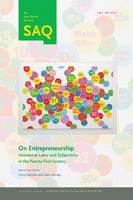Israeli Jews Address the Palestinian Boycott Call
 AGAINST the DAY
AGAINST the DAY
Israeli Jews Address the Palestinian Boycott Call
South Atlantic Quarterly (2015) 114(3)
The Challenge of the BDS
By Adi Ophir
BDS Is As Good As It Gets
By Dov Michaeli
Abstract : This essay analyzes the impasses of the Israeli mainstream and non-Zionist Left. It suggests that, given these impasses and the political strategies available in current discourse, BDS stands out as a viable form of opposition to the occupation.
On the Law, Politics, and Ethics of BDS
By Itamar Mann
Abstract : The BDS movement has cast its campaign in legal terms, successfully conceptualizing the regime currently in place in Israel-Palestine as one that violates international law and requires a measure of transnational enforcement. Yet, from the perspective of Jewish Israeli citizens, partaking in such enforcement may require stepping out of the existing community—both symbolically and materially. This essay examines the stakes of such a move, weighing its potential benefits and costs in terms of advancing an egalitarian democratic future in Israel-Palestine.
Where Do You Draw the Line ?
By Galit Eilat
Abstract : This article surveys recent developments in the BDS movement and its call for a cultural and academic boycott of Israel. It analyzes the policy of the cultural boycott in comparison with other forms of boycott as well its effectiveness in different circumstances. The most effective strategy is not necessarily to enforce a boycott but to create a vibrant public discussion about Israeli policies against the Palestinians. The legislative power of the Israeli position is compared with the much weaker force of international pressure that the Palestinian population can bring to bear. Yet, even in this unequal exchange, the boycott movement and its cultural wing are achieving traction. The essay suggests the possibility of a shift in Israeli society against the political and intellectual consequences of occupation.
“We,” Palestinians and Jewish Israelis : The Right Not to Be a Perpetrator
By Ariella Azoulay
Abstract : Assuming that the BDS is the largest civil movement today claiming to change the Israeli political regime, what type of “we” does it enable ? In this essay, I try to answer this question, based on the premise that the response of Jewish Israeli citizens to the crimes and abuses perpetrated by their own regime cannot be based on external solidarity. Jewish Israelis are governed alongside Palestinians, and they are subjects of the same political regime. Their citizenship is a constitutive element of a regime of differentiations and hierarchy in which Jewish Israeli citizens are the privileged group. Not being able to endorse the boycott from the outside, Jewish Israelis can—and should—participate in it ; their participation turns the BDS movement’s call into a campaign to redefine citizenship as co-citizenship based on the right not to be perpetrator.
http://saq.dukejournals.org/content/current